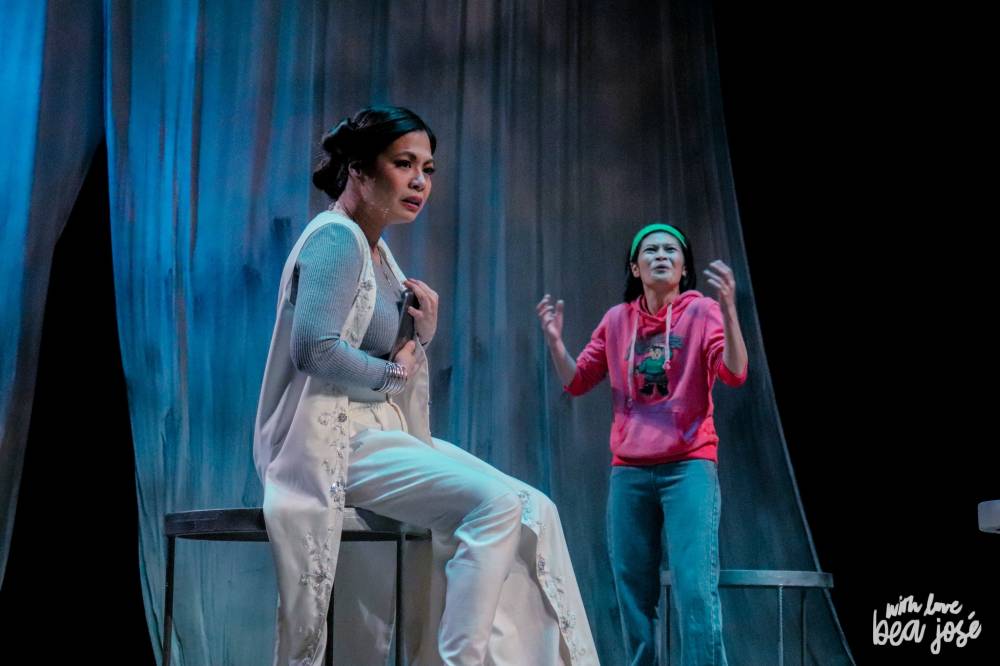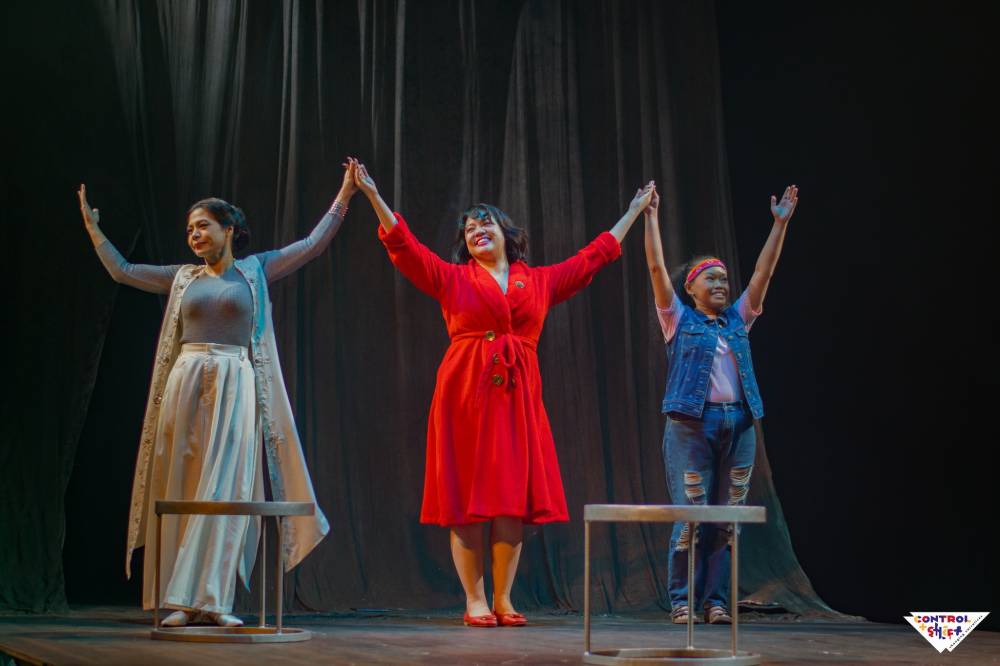3 short plays tackle impossible conversations

It is likely impossible to exit the theater, after seeing the production “Kumprontasyon,” made up of three short plays, without feeling overwhelmed—with awe at each story’s powerful writing; with admiration for the talented actors who brought these stories to life; and with a longing for better leaders who will, to paraphrase one line in the show, put the country’s needs before their own.
The three one-act plays that “Kumprontasyon” presents—”Lakambini,” by Allan Palileo; “The Impossible Dream,” by Guelan Luarca; and “A Color for Tomorrow,” by Joshua Lim So—focus on “conversations that you wish really happened” in the course of our country’s history.
“Lakambini” takes us back to the early days of the Republic of the Philippines, where a tense and entirely fictional encounter takes place between Emilio Aguinaldo, played by Teroy Guzman, and Gregoria de Jesus, or Oriang, Andres Bonifacio’s widow, played by Sherry Lara.

“The Impossible Dream” is another imagined conversation, this time between political adversaries Ferdinand Marcos Sr., played by Ron Capinding, and Ninoy Aquino, played by Romnick Sarmenta, who are caught in a debate gridlock as they push each other to stand down for the sake of the country.
“A Color for Tomorrow” is set in the near future, featuring an advertising veteran, played by Missy Maramara, talking to her younger selves, played by Adrienne Vergara and Gillian Vicencio, as she struggles with being on the brink of Alzheimer’s, grasping at her memories and the ideals of her youth, when she once believed and fought for a Leni Robredo presidency.
Unspoken question
In all three plays, there is an unspoken question posed to the audience: How can we do better when it comes to choosing our leaders?
“This is basically my reaction to the result of the 2022 election, when Marcos won and was returned to power. My thought was, how did that happen?” said director Melvin Lee during a talkback after the show’s last run on Feb. 9 at the Peta Theater Center, as part of their ongoing festival “Control+Shift: Changing Narratives.” Lee produced “Kumprontasyon” for his masteral thesis.

“I also realized, Filipinos have a tendency to forget, sweep everything under the rug, and just move on. So I thought, we need a production that would present the opportunity for us to confront these issues, which tend to repeat themselves at different times in our history,” Lee added.
At its last show, “Kumprontasyon” welcomed two extra special guests in its audience: Maria Paz and Maria Lourdes Nakpil Santos-Viola, granddaughters of Julio Nakpil, who married the widowed De Jesus. Reinforcing the production’s call to confront the problems that persist in the country, the two likewise challenged Filipinos to fight for justice—not loudly, not with bloodshed, but simply by speaking up against injustice and not turning a blind eye to it.
Justice
In “Lakambini,” justice, in the form of an apology on bended knee, is what Oriang asks of Aguinaldo, for having her husband killed, for destroying their lives. It is a scene that makes the audience hold their breath, as well as wonder whether the real Aguinaldo ever felt remorse for his actions, as the imagined conversation in the play suggests.
It was easy to find Aguinaldo unlikeable in “Lakambini,” and the expectation, when “The Impossible Dream” started, was that the feeling would be the same toward Marcos, given, after all, his role in Philippine history. But his quick-witted lines—“I strategically fracture the truth, but I never lie”—and jolly demeanor, a stark contrast to the somber, tired political detainee Aquino, definitely brought up confusing emotions, as attested to by another special guest in the audience, Dr. Judy Taguiwalo, social worker, activist, educator, and martial law survivor.

“‘The Impossible Dream’ was sad for me, because I wanted Ninoy to be feisty,” Taguiwalo, who was detained herself during martial law, said during the talkback. “I couldn’t believe that we would like Marcos because he was so funny. Even in a play, I couldn’t accept that.”
Taguiwalo, who is turning 75, also turned emotional as she talked about the advertising hotshot in “A Color for Tomorrow,” particularly because of the character’s creeping forgetfulness about her youth and the leader she so passionately advocated for during the 2022 elections.
“I was crying for that generation, because many of those who shouted, ‘Ang Presidente!’ during the Robredo campaign faced a lot of mental health issues after the elections. And that is what we want to break; that despite the loss, how do we move on, because, as Ninoy in the second play says, we only have one country,” Taguiwalo said.

















